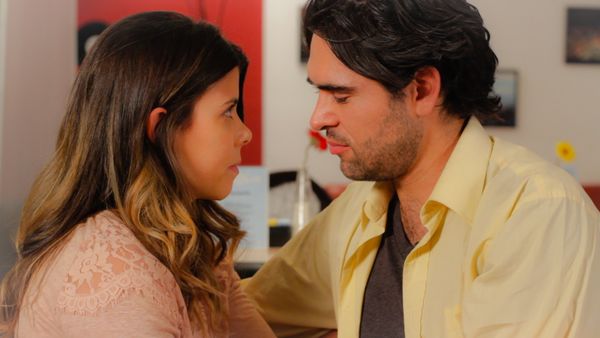Eye For Film >> Movies >> In Transit (2018) Film Review
In Transit
Reviewed by: Jennie Kermode

Edward Norton's Fight Club character called them 'single serving friends,' those strangers encountered in passing as we make our way from one place to another. The anonymity involved, the unlikeliness of ever seeing them again, makes it possible to share things we might be less willing to share with those we're closer to. It reduces all manner of risks. When Daniel (Oliver Rayon) starts making conversational overtures to Olga (Branca Ferrazo) she doesn't ignore him as many women might, but takes a chance. Given what we later learn, it may be that the last thing she wants is to be alone with her thoughts.
Daniel and Olga are in an airport café waiting for news about flights. They're also, in their different ways, waiting for new phases of their lives to begin. Both have experienced tragedy and the film's focus is on the complicated way in which they draw out one another's stories, each able to risk a little more as the other reveals more vulnerability. At first their exchanges are awkward, artificial as their surroundings, but gradually they develop a degree of trust and begin to reconsider aspects of the journeys they're on.

There's a bold gamble underlying this film. Although character work was carried out beforehand, the dialogue is improvised, thus capturing some of the genuine awkwardness and uncertainty of such situations. Ferrazo manages impressively (and bilingually) but Rayon is not as effective and his struggle for words sometimes makes him seem creepy or disingenuous, which disrupts the rhythm of the film. There are also a number of problems common to low budget first features, such as overly abrupt cuts between scenes, poor sound work and an intrusive score that detracts from the impact of key scenes, and there are some jarring little plot points like Daniel's fondness for carrying magnets with him when magnets are not usually allowed on aeroplanes.
It was perhaps a little too ambitious to improvise in a situation where it wasn't possible to ensure higher production values, as the overall result is a film that looks poorer than it really is when one pays attention to the craft involved. The two characters' stories are well developed and enhanced by the additional talent each actor brings to their role. Flashbacks add visual depth and director Julia Camara finds ways of moving her characters around the pointedly dull environment of the café to change the mood. She steers away from the route the film would be likely to take in Hollywood and focuses on character development. If you're sitting somewhere killing time whilst in transit, you could do worse than to watch the result.
Reviewed on: 01 Oct 2018
















